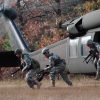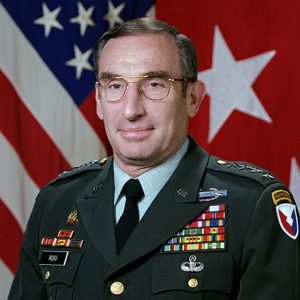calsfoundation@cals.org
Jimmy Douglas Ross (1936–2012)
Jimmy Ross was an officer in the U.S. Army who rose to the rank of general. Ross was named as a Distinguished Alumnus of Henderson State University in 1986 and to the university’s Sports Hall of Fame in 2004.
Jimmy Douglas Ross was born in Hosston, Louisiana, on May 23, 1936, to Horace and Lucile Ross. The Ross family was originally from Arkadelphia (Clark County), and Horace was a worker in the oil industry. The family had an older son, Bob.
The Ross family moved to Curtis (Clark County) in 1942 before living in Mississippi, Tennessee, Texas, and California. Returning to Curtis in 1945, Jimmy Ross attended school in Arkadelphia. Playing football, basketball, and baseball, as well as running track, Ross was heavily recruited by colleges when he graduated in 1954. He followed his high school sweetheart to Henderson State Teachers College (now Henderson State University) and played football and baseball, lettering in both. He also joined the Reserve Officers’ Training Corps (ROTC) program. In 1955, Ross married Pat Cox while both were students at Henderson. The couple had two daughters and a son.
Graduating in 1958, Ross received his commission as a second lieutenant in the army and began an initial three-year commitment. The first two years of his service were to be spent in the infantry, followed by a year in the transportation branch. Reporting to Fort Benning, Georgia, Ross shared an office with future fellow general Colin Powell. Ross completed Infantry Officer Basic Training, Airborne School, and Ranger School at Fort Bragg in North Carolina before receiving his first assignment, with the Twenty-fifth Infantry Division at Scofield Barracks, Hawaii. After two years with the Fourteenth Infantry Regiment, Ross was transferred to the Thirty-third Transportation Battalion.
Ross’s first overseas assignment was in 1961 in Thailand, where he served as an advisor to Thai and Laotian forces until 1962. Returning to the United States, Ross attended the Advanced Transportation Officers Course. At the conclusion of the course, Ross was promoted to captain and transferred to Fort Campbell on the Kentucky-Tennessee border, where he commanded a transportation truck company. His unit was deployed to Oxford, Mississippi, in 1962 when James Meredith integrated the University of Mississippi. In 1964, Ross was deployed to Vietnam, where he served as an advisor. At the conclusion of his tour in 1965, Ross was awarded the Bronze Star, the Air Medal, and the Combat Infantryman’s Badge.
Stationed at Fort Bragg, Ross was selected for early promotion to major and served as the assistant chief of staff, logistics, for the XVIII Airborne Corps. In 1966, he attended the Command and General Staff College at Fort Leavenworth, Kansas, and the next year was assigned to MacDill Air Force Base in Florida, where he served in the U.S. Strike Command in the transportation division. Ross deployed to numerous countries in Africa, as well as the United States and South Korea during his tour at MacDill. In April 1968, Ross served with the Eighty-second Airborne Division in Washington DC during riots following the assassination of Dr. Martin Luther King Jr. Returning to Vietnam in 1969 with the 101st Airborne Division, Ross served as the daily logistic support officer. In January 1970, Ross took command of the Tenth Transportation Battalion at Cam Ranh Bay, Vietnam.
Ross was promoted to lieutenant colonel and returned to the United States in June 1970. The same month, Ross began the Logistics Executive Development Course and, upon the completion of the class, served at the Pentagon on the staff of the assistant deputy chief of staff of logistics for supply and maintenance. This assignment was followed by a posting as the assistant director of army staff in the Office of the Chief of Staff for the Army. Attending the Industrial College of the Armed Forces (now the Eisenhower School) in Washington DC, Ross also earned an MBA from Central Michigan University while stationed at the Pentagon.
In 1975, Ross was promoted to colonel and assigned as a comptroller to the Military Traffic Management Command in Oakland, California. Ross’s next post was as the commander of the Fourth Transportation Brigade in Germany. In November 1979, Ross was promoted to brigadier general and commanded the Second Support Command of the VII Corps. In 1982, he returned to the Pentagon, where he assumed a post as the director of transportation, energy, and troop support. While Ross was in command, the army transitioned to the Meal Ready to Eat (MRE) system that is still used to feed troops in the field. In 1984, Ross became the chief of staff of the Army Materiel Command and was promoted to the rank of major general in 1986. The same year, he became the commander of the Army Depot Command. In 1987, he returned to the Pentagon as the deputy chief of logistics, receiving promotion to lieutenant general the same year. His final post was as the commander of the Army Materiel Command, which he assumed in 1992, the same year he was promoted to the rank of general. He retired from the army in March 1994.
Ross became an avid marathon runner at the age of fifty. He died on May 2, 2012, from cancer and is buried in Arlington National Cemetery.
For additional information:
Obituary of General Jimmy D. Ross. Daytona Beach News-Journal, May 6, 2012. Online at http://www.legacy.com/obituaries/news-journalonline/obituary.aspx?pid=157483234 (accessed September 15, 2020).
Ross, Jimmy. A Devotion to Duty: Memoirs of General Jimmy D. Ross, U.S. Army, Retired. Fort Belvoir, VA: U.S. Army Materiel Command, 2007.
David Sesser
Henderson State University
 Divergent Prosperity and the Arc of Reform, 1968–2022
Divergent Prosperity and the Arc of Reform, 1968–2022 Military
Military Recreation and Sports
Recreation and Sports Jimmy Ross
Jimmy Ross 



Comments
No comments on this entry yet.